Charles E W Bean, Diaries, AWM38 3DRL 606/2/1 - January - March 1915 - Part 5
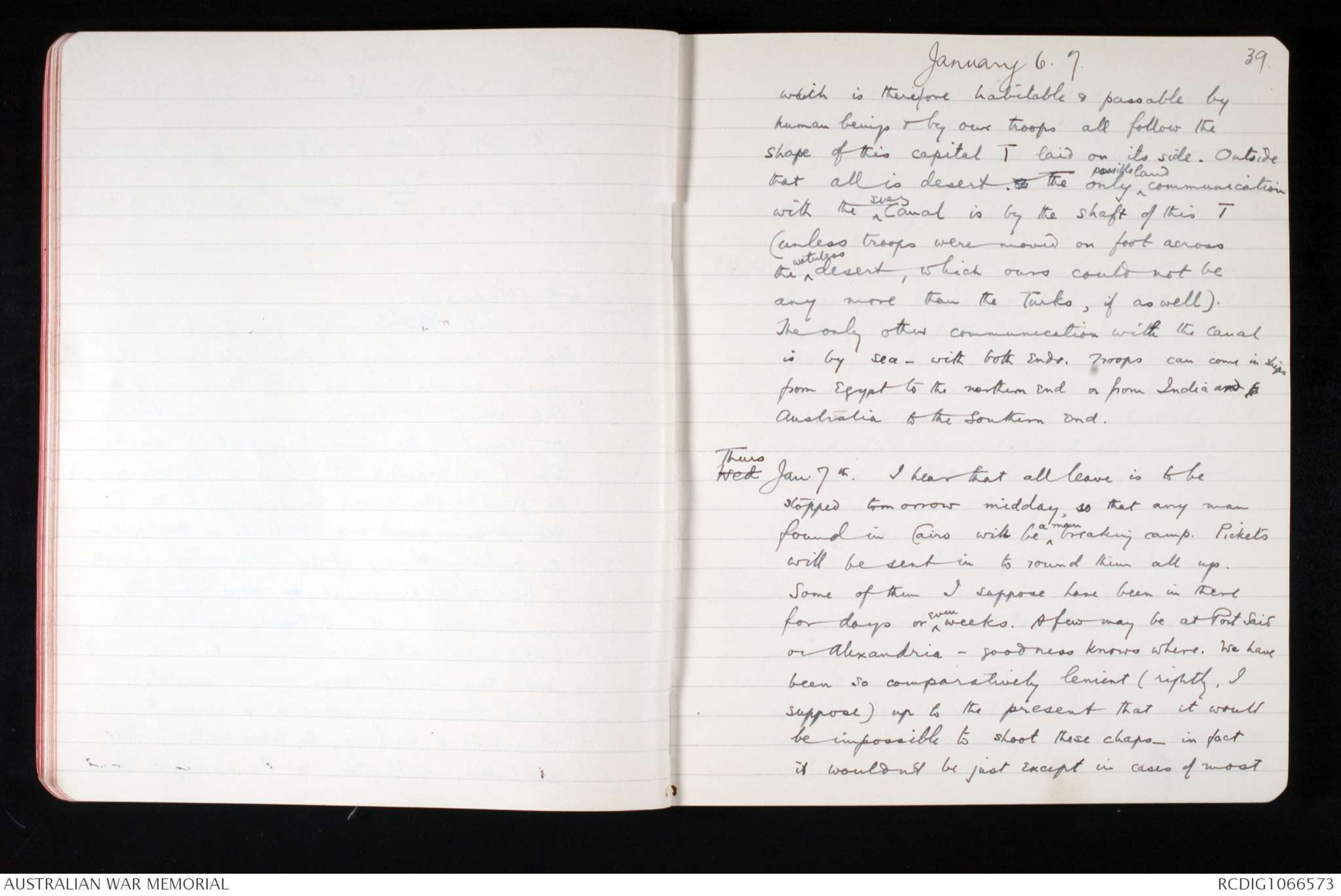
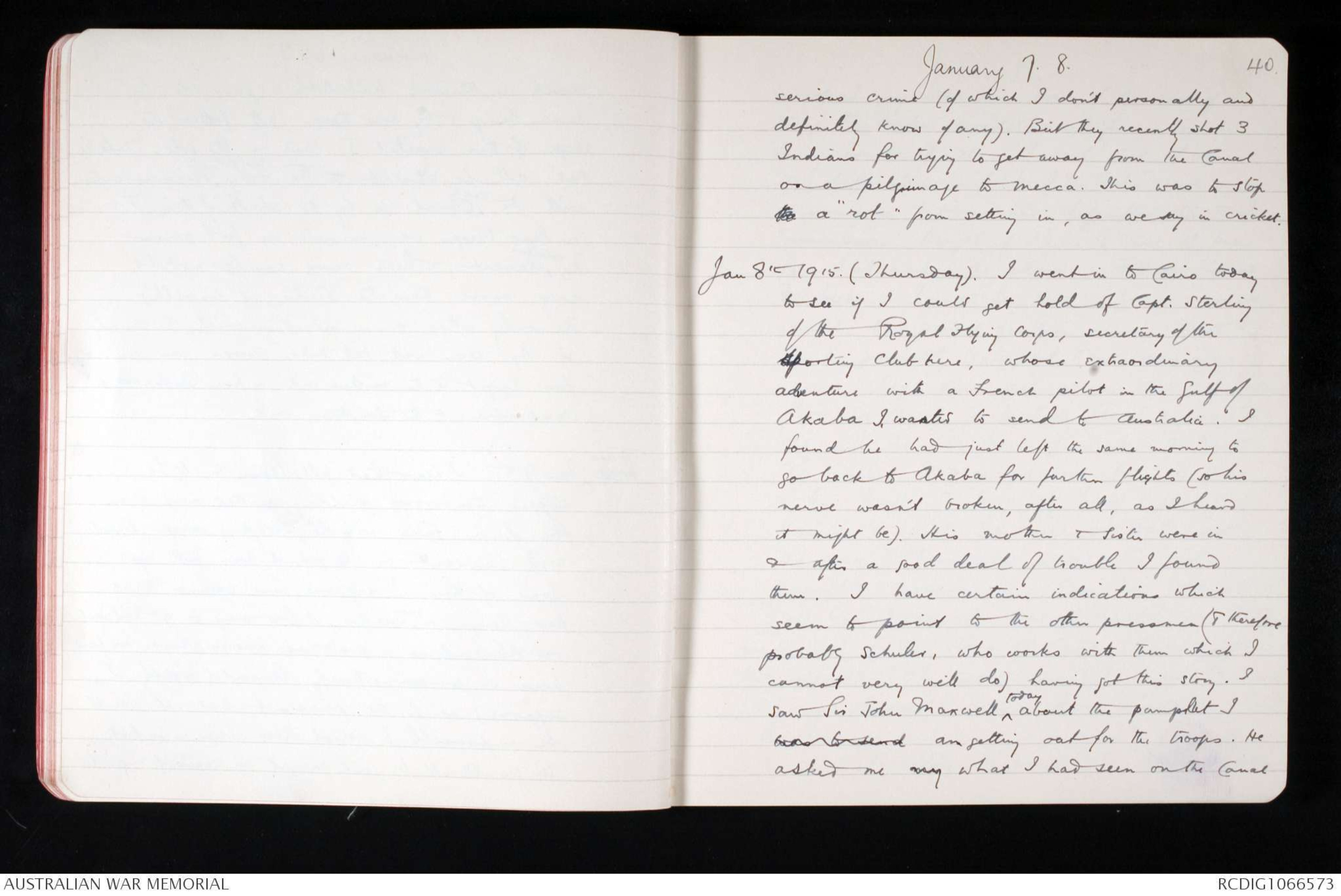
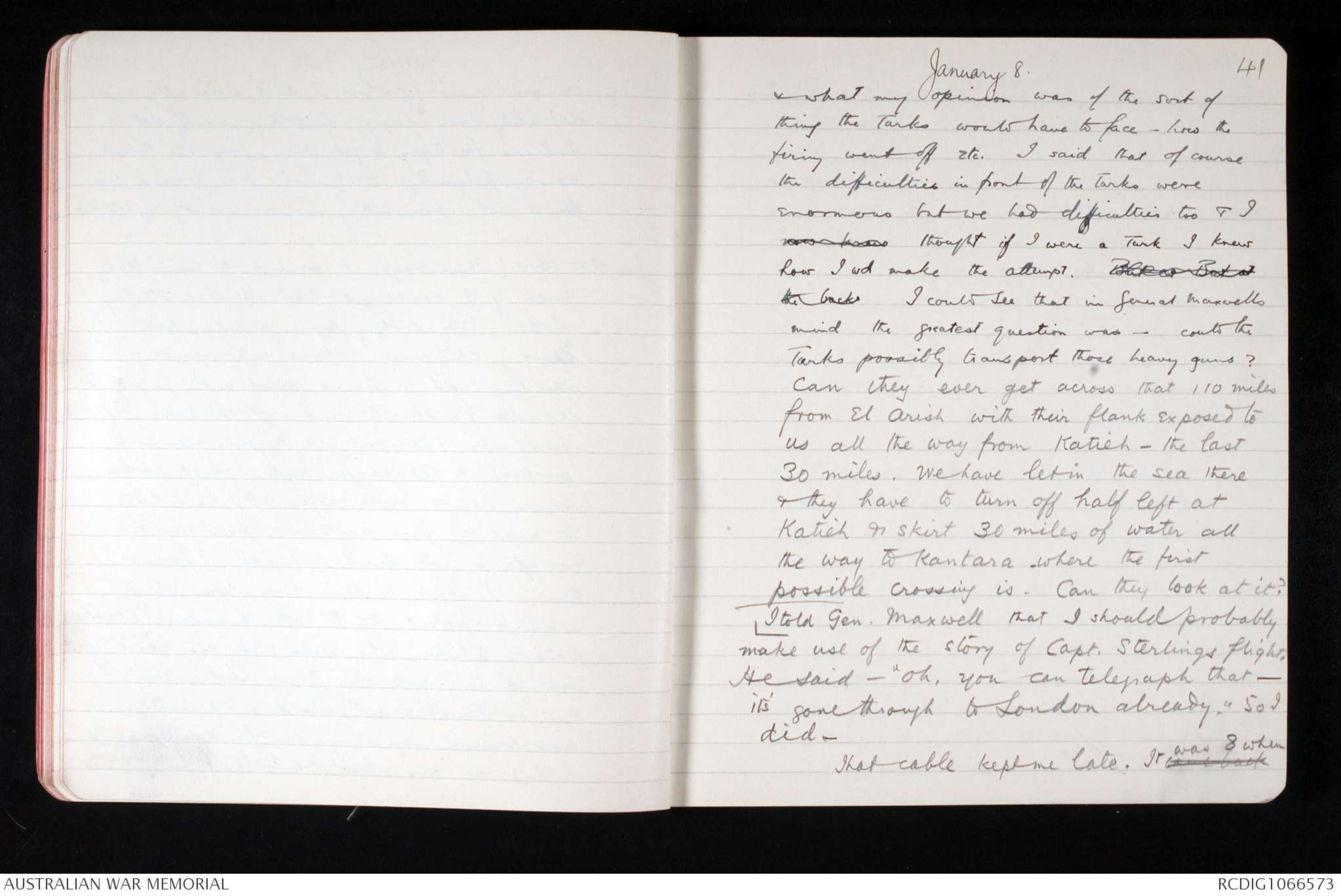
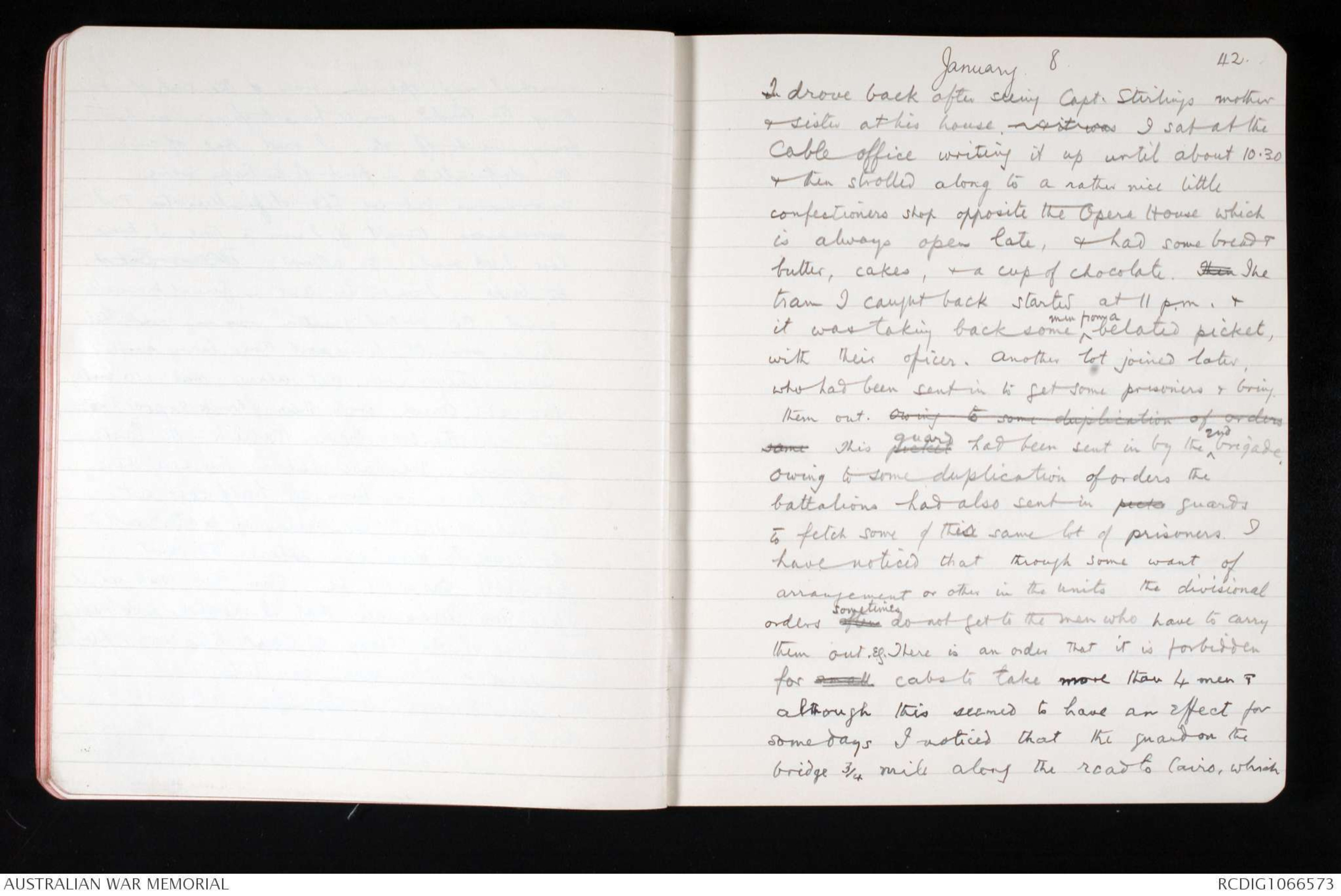
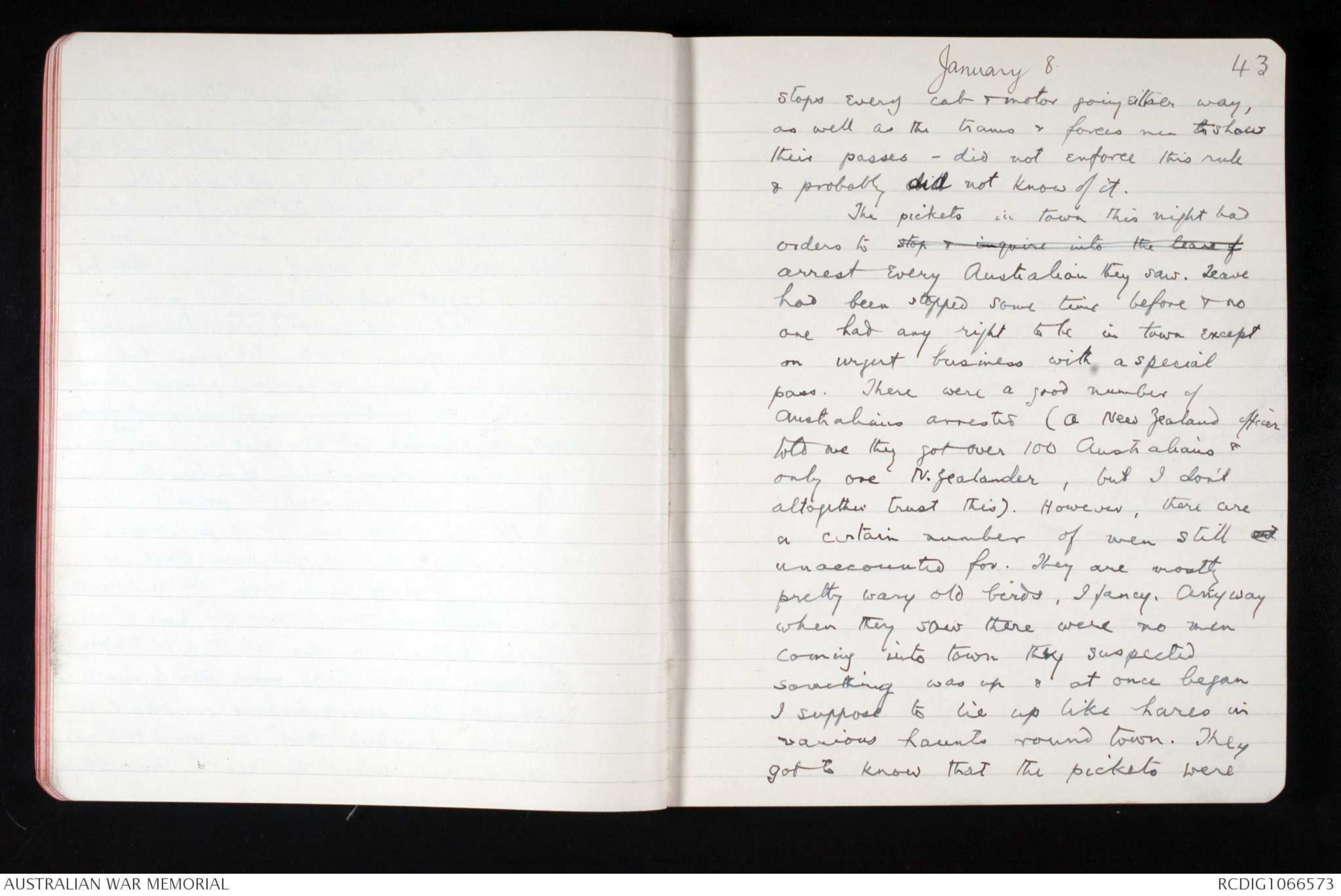
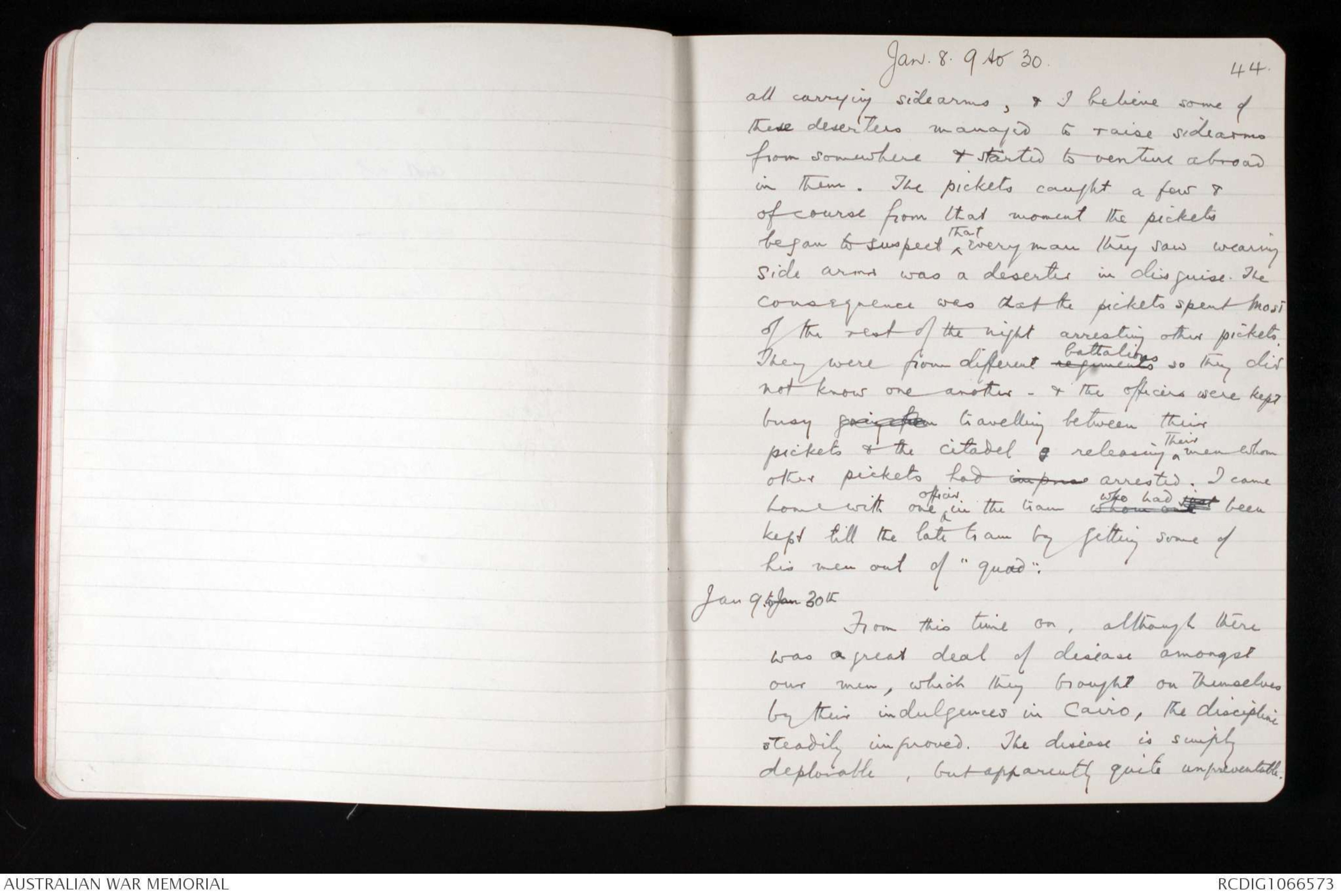
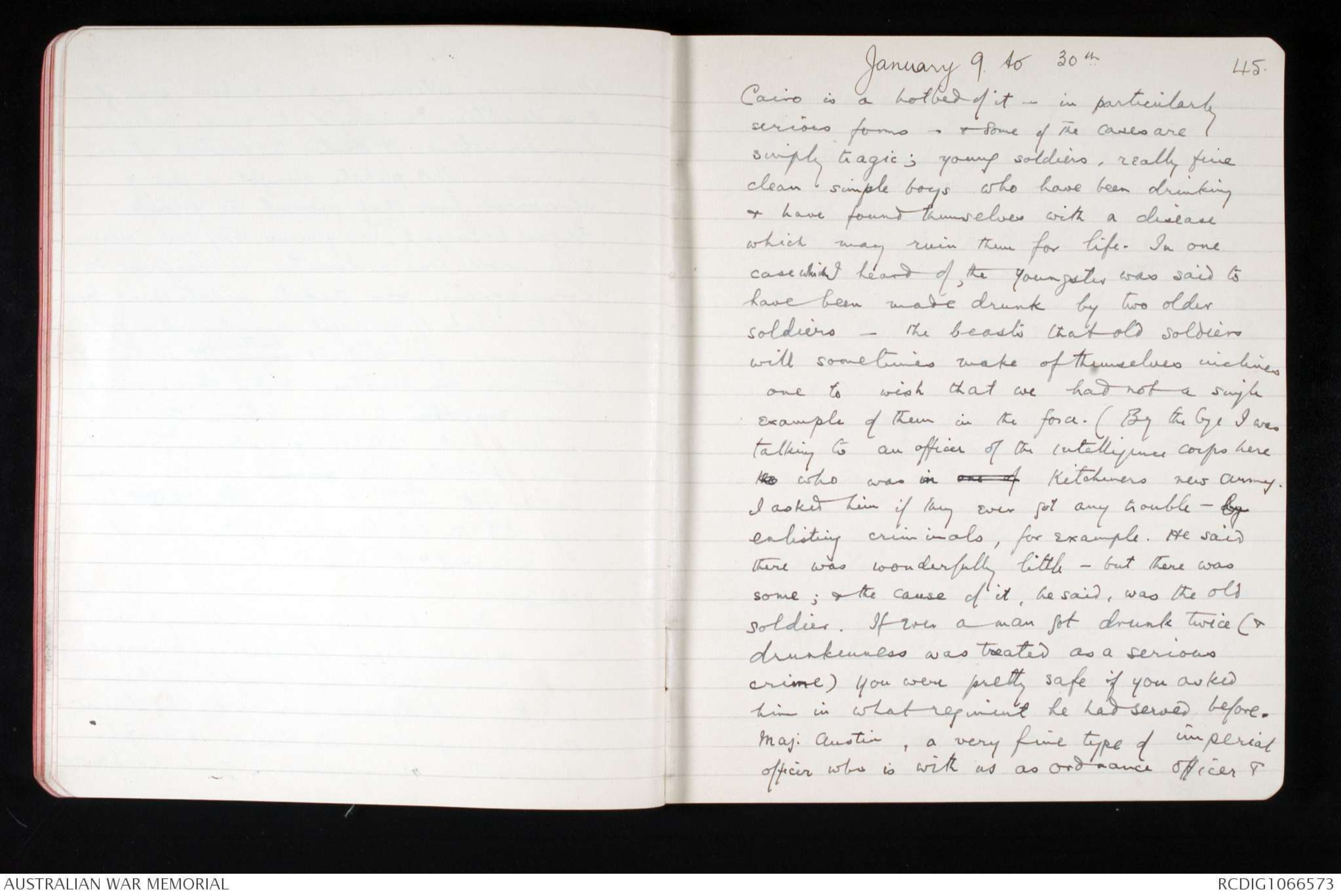
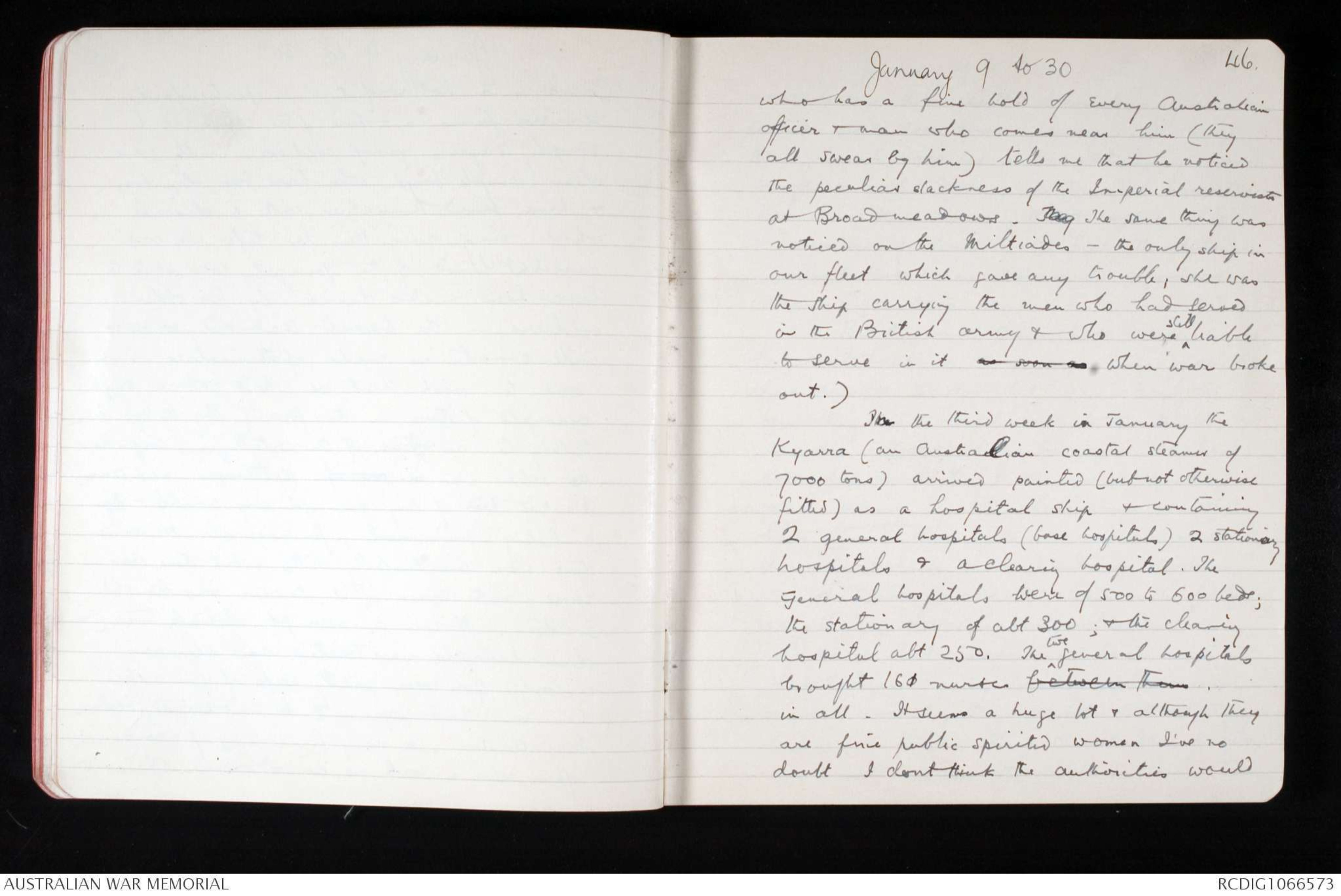
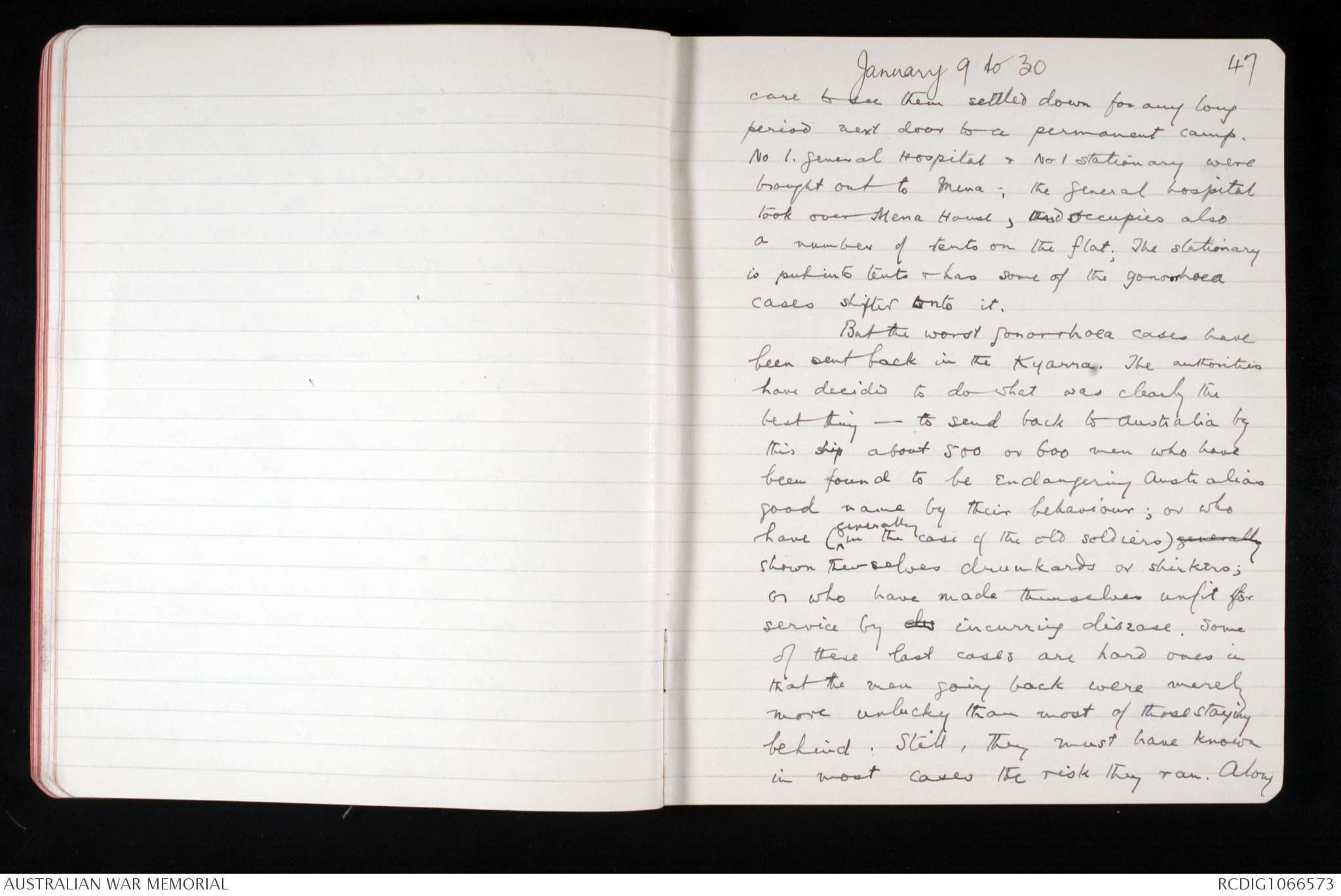
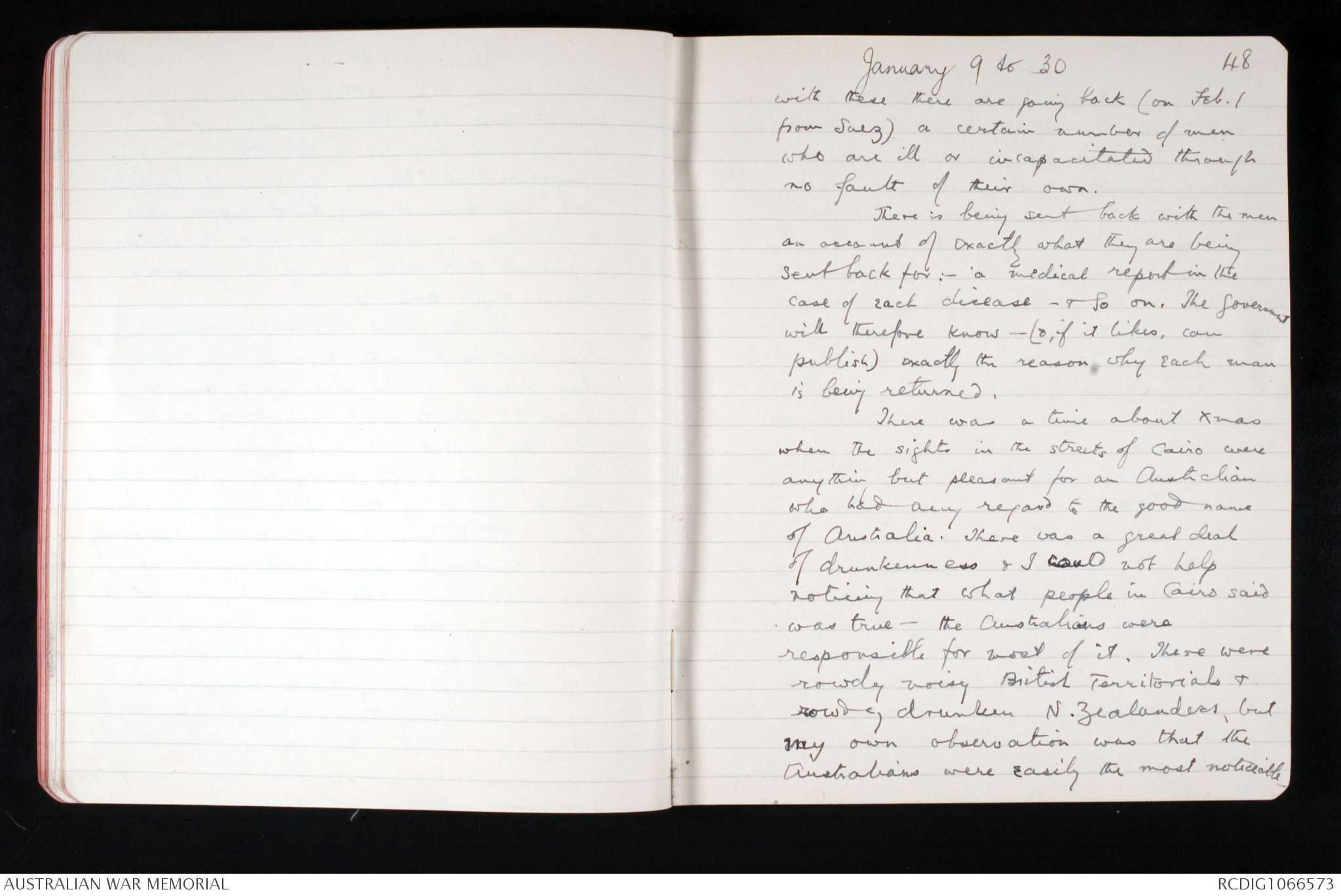
39.
January 6. 7.
which is therefore habitable & passable by
human beings & by our troops all follow the
shape of this capital T laid on its side. Outside
that all is desert. xx The only ^ possible land communication
with the ^ Suez Canal is by the shaft of this T
(unless troops were moved on foot across
the ^ waterless desert, which ours could not be
any more than the Turks, if as well).
The only other communication with the Canal
is by sea - with both ends. Troops can come in ships
from Egypt to the northern end or from India and a
Australia to the Southern end.
Thurs Wed Jan. 7th. I hear that all leave is to be
stopped tomorrow midday, so that any man
found in Cairo will be ^ a man breaking camp. Pickets
will be sent in to round them all up.
Some of them I suppose have been in there
for days or ^ even weeks. A few may be at Port Said
or Alexandria - goodness knows where. We have
been so comparatively lenient (rightly, I
suppose) up to the present that it would
be impossible to shoot these chaps - in fact
it wouldn't be just except in cases of most
40.
January 7. 8.
serious crime (of which I don't personally and
definitely know of any). But they recently shot 3
Indians for trying to get away from the Canal
on a pilgrimage to Mecca. This was to stopthe a "rot" from setting in, as we say in cricket.
Jan 8th 1915. (Thursday). I went in to Cairo today
to see if I could get hold of Capt. Sterling
of the Royal Flying Corps, secretary of the
Sporting Club here, whose extraordinary
adventure with a French pilot in the Gulf of
Akaba I wanted to send to Australia. I
found he had just left the same morning to
go back to Akaba for further flights (so his
nerve wasn't broken, after all, as I heard
it might be). His mother & sister were in
& after a good deal of trouble I found
them. I have certain indications which
seem to point to the other pressmen (& therefore
probably Schuler, who works with them which I
cannot very well do) having got this story. I
saw Sir John Maxwell ^ today about the pamphlet Iwas to send am getting out for the troops. He
asked me my what I had seen on the Canal
41
January 8.
& what my opinion was of the sort of
thing the Turks would have to face - how the
firing went off etc. I said that of course
the difficulties in front of the Turks were
enormous but we had difficulties too & Inow knew thought if I were a Turk I knew
how I wd make the attempt. But x But atthe back I could see that in General Maxwells
mind the greatest question was – could the
Turks possibly transport those heavy guns?
Can they ever get across that 110 miles
from El Arish with their flank exposed to
us all the way from Katieh - the last
30 miles. We have let in the sea there
& they have to turn off half left at
Katieh & skirt 30 miles of water all
the way to Kantara -where the first
possible crossing is. Can they look at it?
I told Gen. Maxwell that I should probably
make use of the story of Capt. Sterlings flight.
He said - "oh, you can telegraph that -
it's gone through to London already." So I
did-
That cable kept me late. It came back was 8 when
42.
January 8.
I drove back after seeing Capt. Stirlings mother
& sister at his house. - & it was I sat at the
Cable office writing it up until about 10.30
& then strolled along to a rather nice little
confectioners shop opposite the Opera House which
is always open late, & had some bread &
butter, cakes, & a cup of chocolate. Then The
tram I caught back started at 11 p.m. &
it was taking back some ^ men from a belated picket,
with their officer. Another lot joined later,
who had been sent in to get some prisoners & bring
them out. Owing to some duplication of orderssome This picket guard had been sent in by the ^ 2nd brigade.
Owing to some duplication of orders the
battalions had also sent in pick guards
to fetch some of this same lot of prisoners. I
have noticed that through some want of
arrangement or other in the units the divisional
orders often sometimes do not get to the men who have to carry
them out. eg. There is an order that it is forbidden
for small cabs to take more than 4 men &
although this seemed to have an effect for
some days I noticed that the guard on the
bridge ¾ mile along the road to Cairo, which
43
January 8.
stops every cab & motor going either way,
as well as the trams & forces men to show
their passes - did not enforce this rule
& probably did not know of it.
The pickets in town this night had
orders to stop & inquire into the leave of
arrest every Australian they saw. Leave
had been stopped some time before & no
one had any right to be in town except
on urgent business with a special
pass. There were a good number of
Australians arrested (a New Zealand officer
told me they got over 100 Australians &
only one N. Zealander, but I don't
altogether trust this). However, there are
a certain number of men still out
unaccounted for. They are mostly
pretty wary old birds, I fancy. Anyway
when they saw there were no men
coming into town they suspected
something was up & at once began
I suppose to lie up like hares in
various haunts round town. They
got to know that the pickets were
44.
Jan. 8. 9 to 30.
all carrying sidearms, & I believe some of
these deserters managed to raise sidearms
from somewhere & started to venture abroad
in them. The pickets caught a few &
of course from that moment the pickets
began to suspect ^ that every man they saw wearing
side arms was a deserter in disguise. The
consequence was that the pickets spent most
of the rest of the night arresting other pickets.
They were from different regiments battalions so they did
not know one another - & the officers were kept
busy going from travelling between their
pickets & the citadel x releasing ^ their men whom
other pickets had impris arrested. I came
home with one ^ officer in the tram whom one who had just been
kept till the late tram by getting some of
his men out of "quad".
Jan 9. to Jan 30th
From this time on, although there
was a great deal of disease amongst
our men, which they brought on themselves
by their indulgences in Cairo, the discipline
steadily improved. The disease is simply
deplorable, but apparently quite unpreventable.
45.
January 9. to 30th
Cairo is a hotbed of it - in particularly
serious forms - & some of the cases are
simply tragic; young soldiers, really fine
clean simple boys who have been drinking
& have found themselves with a disease
which may ruin them for life. In one
case which I heard of, the youngster was said to
have been made drunk by two older
soldiers - the beasts that old soldiers
will sometimes make of themselves inclines
one to wish that we had not a single
example of them in the force. (By the bye I was
talking to an officer of the Intelligence corps heretha who was in one of Kitcheners new Army.
I asked him if they ever got any trouble - by
enlisting criminals, for example. He said
there was wonderfully little - but there was
some; & the cause of it, he said, was the old
soldier. If ever a man got drunk twice (&
drunkenness was treated as a serious
crime) you were pretty safe if you asked
him in what regiment he had served before.
Maj. Austin, a very fine type of imperial
officer who is with us as ordnance officer &
46.
January 9 to 30
who has a fine hold of every Australian
officer & man who comes near him (they
all swear by him) tells me that he noticed
the peculiar slackness of the Imperial reservists
at Broadmeadows. They The same thing was
noticed on the Miltiades - the only ship in
our fleet which gave any trouble; she was
the ship carrying the men who had served
in the British army & who were ^ still liable
to serve in it as soon as when war broke
out.)The the third week in January the
Kyarra (an Australian coastal steamer of
7000 tons) arrived painted (but not otherwise
fitted) as a hospital ship & containing
2 general hospitals (base hospitals) 2 stationary
hospitals & a clearing hospital. The
General hospitals were of 500 to 600 beds;
the stationary of abt 300; & the clearing
hospital abt 250. The ^ two general hospitals
brought 1601 nurses between them
in all. It seems a huge lot & although they
are fine public spirited women I've no
doubt I dont think the authorities would
47
January 9 to 30
care to see them settled down for any long
period next door to a permanent camp.
No 1. general Hospital & No 1 stationary were
brought out to Mena; the general hospital
took over Mena House, and occupies also
a number of tents on the flat; The stationary
is put into tents & has some of the gonorrhoea
cases shifted into it.
But the worst gonorrhoea cases have
been sent back in the Kyarra. The authorities
have decided to do what was clearly the
best thing - to send back to Australia by
this ship about 500 or 600 men who have
been found to be endangering Australias
good name by their behaviour; or who
have (^ generally in the case of the old soldiers) generally
shown themselves drunkards or shirkers;
or who have made themselves unfit for
service by dis incurring disease. Some
of these last cases are hard ones in
that the men going back were merely
more unlucky than most of those staying
behind. Still, they must have known
in most cases the risk they ran. Along
48
January 9 to 30
with these there are going back (on Feb. 1
from Suez) a certain number of men
who are ill or incapacitated through
no fault of their own.
There is being sent back with the men
an account of exactly what they are being
sent back for: - a medical report in the
case of each disease - & so on. The government
will therefore know - (&, if it likes, can
publish) exactly the reason why each man
is being returned.
There was a time about Xmas
when the sights in the street of Cairo were
anythin but pleasant for an Australian
who had any regard to the good name
of Australia. There was a great deal
of drunkenness & I could not help
noticing that what people in Cairo said
was true - the Australians were
responsible for most of it. There were
rowdy noisy British Territorials &
rowdy drunken N. Zealanders, but
my own observation was that the
Australians were easily the most noticeable.
 Lulu B
Lulu BThis transcription item is now locked to you for editing. To release the lock either Save your changes or Cancel.
This lock will be automatically released after 60 minutes of inactivity.